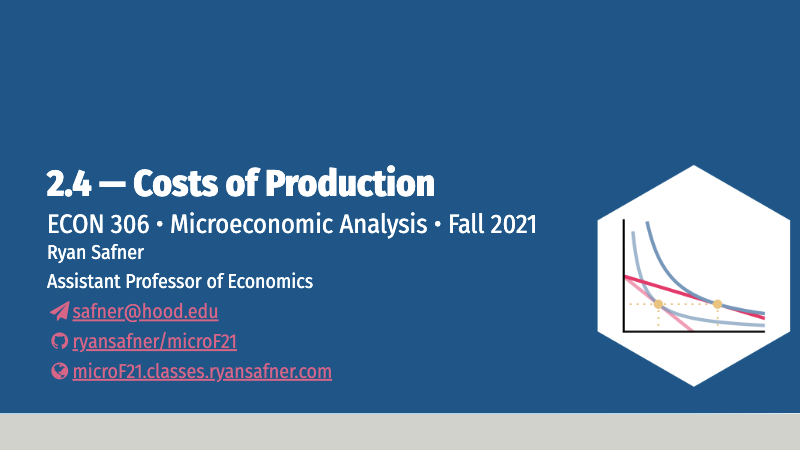Overview
Today we cover costs before we put them together next class with revenues to solve the firm’s (first stage) profit maximization problem. While it seems we are adding quite a bit, and learning some new math problems with calculating costs, we will practice it more next class, when put together with revenues.
Slides
Below, you can find the slides in two formats. Clicking the image will bring you to the html version of the slides in a new tab. Note while in going through the slides, you can type h to see a special list of viewing options, and type o for an outline view of all the slides.
The lower button will allow you to download a PDF version of the slides. I suggest printing the slides beforehand and using them to take additional notes in class (not everything is in the slides)!
Problem Set 3 Due Mon Oct 18
Problem set 3 (on classes 2.1-2.3) is due by the end of the day Monday, October 18 by upload to Blackboard Assignments.
Appendix
The Relationship Between Returns to Scale and Costs
There is a direct relationship between a technology’s returns to scale1 and its cost structure: the rate at which its total costs increase2 and its marginal costs change3. This is easiest to see for a single input, such as our assumptions of the short run (where firms can change but not :
Cobb-Douglas Cost Functions
The total cost function for Cobb-Douglas production functions of the form can be shown with some very tedious algebra to be:
If you take the first derivative of this (to get marginal cost), it is:
How does marginal cost change with increased output? Take the second derivative:
Three possible cases:
- If , this is positive decreasing returns to scale
- Production function exponents
- If , this is negative increasing returns to scale
- Production function exponents
- If , this is constant constant returns to scale
- Production function exponents







